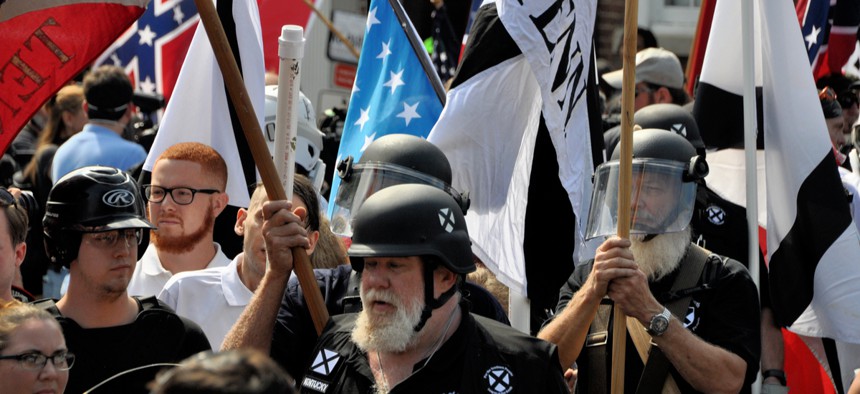It’s part of a pattern of neglect. The grants were administered by the Office of Community Partnerships, which works intimately with local governments and community organizations to prevent jihadist and white-nationalist radicalization. In Obama’s last year, according to the former director, George Selim, the office boasted 16 full-time employees, roughly 25 contractors, and a budget of more than $21 million. The Trump administration has renamed it the Office of Terrorism Prevention, and cut its staff to eight full-time employees and its budget to less than $3 million.
Under Obama, the Office of Community Partnerships housed an interagency task force on “countering violent extremism” that included officials detailed from the FBI, the National Counterterrorism Center, and the Departments of Justice, Education, and Health and Human Services. Today the task force exists in name only. Its staff members have all returned to their home agencies and departments. “Under this administration,” says Selim, who now works at the Anti-Defamation League, “there’s been a precipitous decline in the dedicated staff and program funding devoted to combatting ideologically motivated violence.”
This decline can’t be chalked up to general budget cuts. Although Trump has slashed funding for many domestic departments, he increased Department of Homeland Security spending by more than 7 percent in his first budget and another 4 percent in his second. The cuts stem instead from two biases. First, in keeping with their law-and-order mentality, Trump officials would rather empower the police to arrest suspected terrorists than work with local communities to prevent people from becoming terrorists in the first place, as the Office of Community Partnerships did. Second, they believe the primary terrorist threat to Americans is jihadism, not white supremacy. The Office of Community Partnerships committed the sin of working on both.
From a public-policy perspective, that’s exactly what the government should be doing. In 2017, the FBI concluded that white supremacists killed more Americans from 2000 to 2016 than “any other domestic extremist movement.” But Trump advisers have shrugged off these inconvenient facts. In an interview in 2017, White House Deputy Assistant to the President Sebastian Gorka declared that there “has never been a serious attack or a serious plot [in the United States] that was unconnected from isis or al-Qaeda.” When critics cited the 1995 Oklahoma City bombing, Gorka responded, “It’s this constant ‘Oh, it’s the white man. It’s the white supremacists. That’s the problem.’ No, it isn’t.”
Gorka’s wife, and frequent co-author, Katherine Gorka, shares his Islamo-centric view of terrorism. She has proposed that the U.S. close “radical mosques” and bar Al Jazeera from broadcasting in the United States. “American and Western leaders,” she’s declared, “have preemptively shut down any debate within Islam by declaring that Islam is the religion of peace.” These views matter because although Sebastian has left the Trump White House, Katherine still serves as an adviser to the secretary of Homeland Security. In the months following Trump’s election, according to The Forward, she led a team that proposed replacing the phrase countering violent extremism with countering radical Islamist extremism. The name change didn’t happen. But Eric Rosand, a former senior State Department official, told BuzzFeed that Gorka “played a significant role in denying [Countering Violent Extremism] grant funding to groups that work to de-radicalize neo-Nazis and other far right extremists.”
When Trump supporters insist that he’s a steadfast foe of white supremacy, his critics often cite his history of ambivalent responses—or nonresponses—to anti-Semitism. But Trump’s words aren’t anomalous; he’s put his money where his mouth is.








